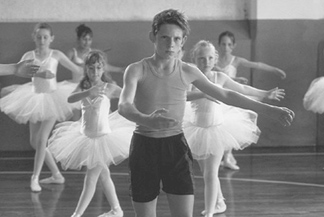Ballet Buzz
'Billy Elliot' contains a certain universal appeal
By Bert Osborne

Jamie Bell as the ballet stud, Billy Elliot
A sleeper hit with film-festival audiences in Cannes, Edinburgh, and Toronto, Billy Elliot is the latest in a burgeoning genre of uplifting films set amid the political and economic strife of working-class England during the throes of Thatcherism in the 1980s. The character Billy Elliot is a motherless boy who lives with his unemployed father and older brother (and his senility-bound grandmother) in a small village threatened with extinction by an ongoing coalminer's strike, but like the band members of Brassed Off or the male strippers of The Full Monty before him, this adolescent protagonist finds a certain reprieve through "artistic self-expression" - in his case, ballet.
The film marks auspicious screen debuts for both the celebrated British stage director Stephen Daldry and for first-time actor Jamie Bell. Julie Walters (of Educating Rita fame) co-stars as the dance teacher who inspires Billy to rise above the drudgery of his life and seek enrollment in the Royal Ballet School of London, much to the initial chagrin of his dad. Ultimately, the kid is torn between a sense of loyalty to his family and the promise of flourishing apart from it.
How does Daldry account for the film's seemingly universal appeal? The 45-year-old director observes, "Ironically, it's the degree of authenticity in the story and the degree of honesty within the performances which allows you to break away from being a film just about that specific time and place or those specific people. The themes in the film are ones we've all seen before, the idea of artistic self-expression as a means of transcending an oppressive environment, or the idea of working one's way through the grief of losing one's mother. It's about the relationship between teacher and student, and it's especially about fathers and sons."
During his prolific career as a resident director with the Royal Court Theatre in London, Daldry has become a teacher and father figure, in a sense. When it came to directing his first film, he says the prime objective was finding just the right acting "student" to play the role of Billy.
"It was a tall order. Obviously, the kid had to dance well enough that it would seem conceivable he could get into a ballet school, right? He also had to come from the very specific geographical region where the story takes place, because it wouldn't be realistic to expect a young actor of that age to fake the accent very convincingly. Most of all, though, he had to ground and carry the entire film," Daldry says.
"Either you find a kid nearest the character and essentially just let him play himself, or you find a kid like Jamie Bell, a proper little actor who can draw on aspects of his own life to play a scene, but who's also capable of making the imaginative leap into situations with which he has no direct experience."
There are many such imaginative leaps in Billy Elliot, and more often than not the film soars on the strength of Bell's performance. During a separate interview, the young actor speaks in a decidedly thick "northern" English accent, but with a considerable wisdom beyond his years (he was 13 when they made the film and has since turned 14). Unlike the character he plays, "I've never had the experience of people trying to hold me back from something. I've always had a lot of encouragement from my family and friends," he notes.
"But I could really relate to Billy in other ways, because I only live about 20 minutes away from where the film is set. You know the scene where he walks into his first dance class and it's all girls? Well, that's the same experience I had," recalls Bell, who started taking dance lessons at the age of 6. The young actor grins and quips, "I used to be keen on playing ice hockey from about the time I was 3, but then I saw a game and it put me off a bit!"
Seriously, though, he also knows a little something about the ridicule Billy endures for the sake of his "artistic self-expression," as director Daldry puts it.
"Yeah, I tried to keep it a secret for a while, but about two years into my training, I started getting a lot of ribbing from some of the other kids at school, calling me a 'puff' or a 'ballerina boy' or whatever," Bell remembers with a shrug.
"That just made it even more of a challenge for me, because I wanted to prove to everybody that dancing wasn't just for girls, that it could be for boys as well."
And so it goes in Billy Elliot, which proves that movies about dancing can appeal to a broad cross-section of audiences, too. For his part, Bell isn't sure what to anticipate from classmates and neighbors back home in terms of reaction to the film. "I keep trying to tell them it's just this tiny little movie about a kid growing up and away from his family," he replies with a laugh, "but they all think I'm starring in a big movie like The Matrix or something like that."
Although it's doubtful to be a Matrix-style blockbuster, all the advance buzz suggests Billy Elliot will be a modest hit, and there's even talk of possible Oscar nominations. No matter how successful the outcome, Daldry insists the last thing he's worried about is being tempted to take the Hollywood money and run, abandoning his theatrical roots in the process.
Indeed, up next for Daldry isn't a mainstream studio movie; he's currently back at the Royal Court, staging the premiere of Caryl Churchill's new play, Far Away.
HOME | THIS ISSUE | ACE ARCHIVES